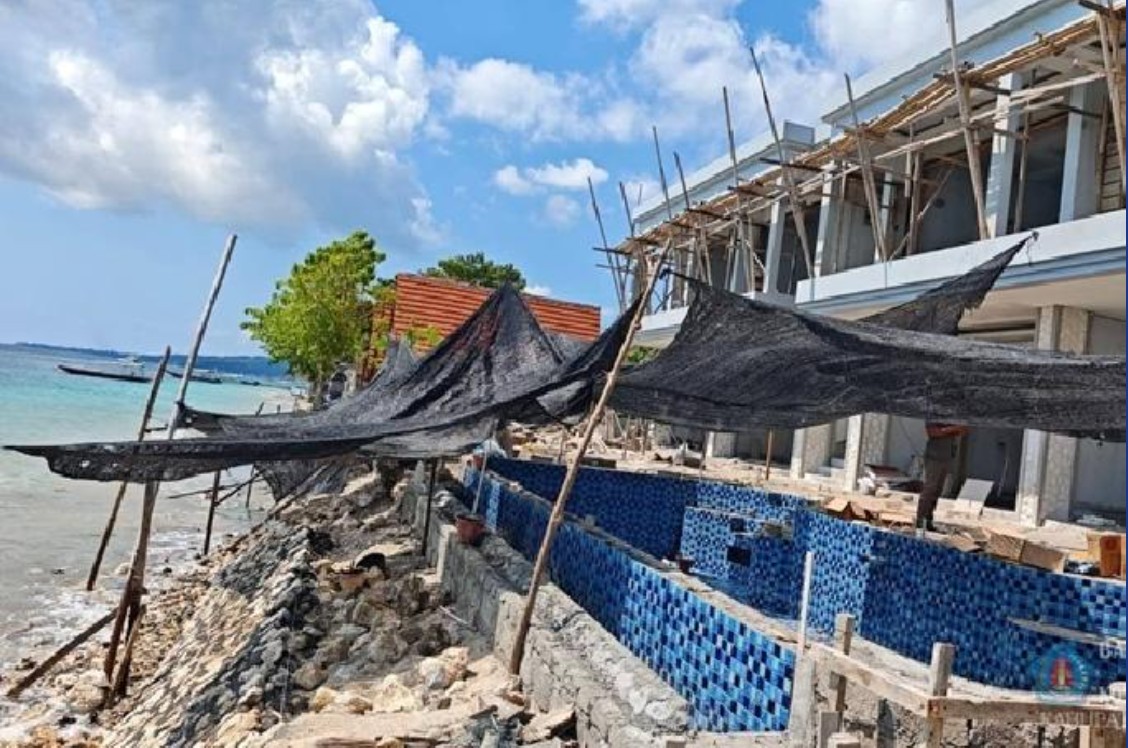Residents of Ped Village, Nusa Penida District, are growing increasingly anxious as coastal erosion continues to eat away at their shoreline.
Instead of seeing the construction of protective sea walls, they are witnessing the rapid rise of unauthorized resorts and restaurants along the narrowing coastline. The situation has caused serious concern.
Many of the newly built structures are not only unlicensed but also constructed dangerously close to the shore, worsening the impact of erosion.
According to Balipost, “The beach is getting smaller, but the buildings keep creeping closer to the sea. What we really need are wave barriers, not more resorts,” a local resident, Made Adnyana, lamented on Tuesday (August 19, 2025).
Harming Tourism Sector
Adnyana also warned that unchecked development is threatening the coastal ecosystem and could ultimately harm the tourism sector that drives the local economy.
These fears were confirmed during a joint inspection conducted by Nusa Penida District officials and civil service police on Friday (August 15, 2025).
They found 3 tourist accommodation projects with problematic or incomplete permits. One project in particular failed to present proper documentation and was built too close to the existing coastal barrier. As a result, construction was immediately halted.
“The work has been suspended until their permits are cleared,” stated Nusa Penida sub-district head, I Kadek Yoga Kusuma, as quoted from BaliNews.
Further investigation revealed two more projects in violation. One lacked a Building Approval Certificate (PBG), while a restaurant located within a resort complex was found to extend too far into the beach area, violating the coastal setback regulation.
Environmental Pressure and Shrinking Farmland
The unchecked rise of illegal development reflects weak oversight along Nusa Penida’s coastline. Beyond harming the environment, it’s also affecting the agricultural sector.
I Wayan Mudayana, a member of the Klungkung Regional House of Representatives, revealed that dry farmland in Nusa Penida has shrunk significantly by about 5,353.59 hectares, or nearly 26% of the island’s total area as tourism development accelerates.
While the boom in accommodation particularly villas has boosted regional tax income, Mudayana noted that many businesses have yet to formalize their operations. This prevents the local government from collecting optimal tax revenue.
He stressed the need for stronger policies to control land conversion in order to protect both the environment and agricultural sustainability.
Urgent Need for Enforcement and Oversight
Responding to the issue, Klungkung Regent I Made Satria outlined several measures being taken, including ongoing education and awareness campaigns. These efforts aim to inform homestay and villa owners especially small operators about the benefits of obtaining proper business licenses and contributing to local tax
revenue.
The regional government has also streamlined the licensing process through the Online Single Submission (OSS) system and offers one-stop permit services both in public service malls and via field officers who visit business locations directly.
“We’re currently conducting a full survey of all tourist accommodations, licensed or not. Our teams are also doing on-site inspections and offering technical assistance to help complete permit applications provided all requirements are met,” Bupati Satria explained as reported by DenPost.
The situation in Ped Village highlights the growing threat facing Nusa Penida’s coastal areas due to unregulated development.
Without firm enforcement and improved oversight, the long-term consequences may include not only severe environmental damage but also the erosion of tourism potential and the loss of local agricultural resilience.
Sources: Denpost.id, Balinews, BaliPost
Feat Image: via MediaIndonesia

